 Dollars
Dollars
Ah, money – that little paper or shiny metal that keeps everything moving, even if it feels like it’s always slipping through your fingers when you need it most. In Canada, hospital visits are free (yay!), but everything else – from medications, to the cost of dying and funeral arrangements – can feel like you’re suddenly signed up for a VIP package you didn’t ask for. The extras? They sure add up fast. But don’t panic – we’ve got you covered with a sliding scale for our service fees because no one should have to choose between dignity and their bank balance. Pay what you can, when you can! We believe everyone deserves access to compassionate, respectful end-of-life services, regardless of how many “Dollars” are sitting in the bank. So, we offer a sliding scale based on the household income of the person who has died and/or the person responsible for payment at the time of death. This way, we can ensure families of all incomes can make dignified choices during such a challenging time. And while we’re on the subject of “Dollars,” let’s also take a moment to appreciate the real treasure: our service providers. These amazing folks pour their time, energy, and expertise into making this transition as smooth and peaceful as possible. They give their hearts at life’s final threshold —honour their gift by giving what you can.
Death Doula
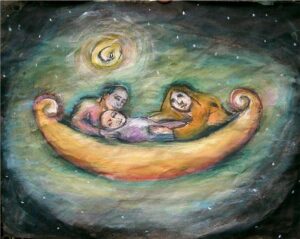 Death Doulas: the only people who can make both existential dread and funeral planning feel like a warm hug. Think of us as the sherpas of the afterlife trek—minus the oxygen tanks but fully stocked with tissues, tea, and an uncanny ability to discuss mortality over muffins. We’re not grim reapers (too dramatic) or funeral directors (too formal); we’re the compassionate, candle-holding, plan-making, deep-listening companions who ensure you exit with style, grace, and maybe even a playlist that doesn’t include “My Heart Will Go On.” Whether it’s holding space for final wishes, guiding loved ones through post-death chaos, or helping you decide between a biodegradable burial or a Viking-style sendoff (local bylaws permitting), we’ve got you covered.
Death Doulas: the only people who can make both existential dread and funeral planning feel like a warm hug. Think of us as the sherpas of the afterlife trek—minus the oxygen tanks but fully stocked with tissues, tea, and an uncanny ability to discuss mortality over muffins. We’re not grim reapers (too dramatic) or funeral directors (too formal); we’re the compassionate, candle-holding, plan-making, deep-listening companions who ensure you exit with style, grace, and maybe even a playlist that doesn’t include “My Heart Will Go On.” Whether it’s holding space for final wishes, guiding loved ones through post-death chaos, or helping you decide between a biodegradable burial or a Viking-style sendoff (local bylaws permitting), we’ve got you covered.
DIAPERS

Here is a thing to consider… you in diapers again. When people are contemplating their end-of-life plans (and there aren’t enough of you doing that) a common marker is whether you can manage to take yourself to the bathroom or not. Sometimes folks say when the day comes that they can’t manage their own ablutions, they will sign out. However, when that day comes, they usually don’t choose to check out.
So adult diapers, good that someone thought of that. For a variety of reasons adults need this product for more flexibility in their lives. Most of us will end up using adult diapers. After we go through rejecting, secrecy, humiliation, adjusting, surrendering, may we find adapting, ease and gratitude. Maybe give you and diapers some thought. Oh, and please consider the eco-friendly reusable types. Mother earth doesn’t need her rich soil full of diapers…. Better off to poo directly into the garden.
Many things from the start of life years visit us again in the end of life years. Vulnerability is warriorship.
DONATION – Organ and Tissue
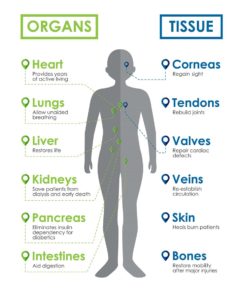
On 18 January 2021, the law for organ and tissue donation changed in Nova Scotia. The Nova Scotia Human Organ and Tissue Donation Act will make it possible for more Nova Scotians to donate their organs and tissues.
When you die expectedly your body becomes part of your estate and your executor/family is legally responsible for and required to see to your disposition.
If you die unexpectedly the medical examiner has the right to your body for as long as they need, before handing to the executor/family for disposition.
Who will have jurisdiction over the corpse with presumed tissue and organ donation?
What condition will the body be in after the recovery of organs and tissue?
If a family wish to reclaim their deceased for home deathcaring, rituals and a green burial will the medical team be sure not to perform any toxic procedures and suture the body appropriately?
Organ and Tissue Donation Info NS
DENIAL
 Spoiler Alert – you will die.
Spoiler Alert – you will die.
In 1973 Ernest Becker won the Pulitzer Prize for The Denial of Death. We’ve been denying for a while. The toss-up seems to be with the dual nature of our physical selves and our symbolic selves. And that comes down too, here we are… what does it mean? The search for meaning or the true nature of reality is good/absolute. It awakens the mind and that, my friends, is a connection to the present, which is wisdom.
They say our life flashes before our mind’s eye in our final days. Will yours be all scared and in denial about the fact that you will die? Or might we find meaning which has us present in our everyday lives?… with whatever is?
Why exactly are we so frightened of death that we avoid looking at it altogether? Or worse, we take all manner of measures to get more “dying days”.
Somewhere, deep down, we know we cannot avoid facing dying and death forever. Nothing is permanent and enduring.
When you are in denial, you’re trying to protect yourself by refusing to accept the truth about mortality.
When you are in denial, you’re trying to protect yourself by refusing to accept the truth about your dying and death that is happening. Refusing to acknowledge mortality is a way of coping with fear, stress, painful thoughts, conflict, threatening information and anxiety. You can be in denial about anything that makes you feel vulnerable or threatens your sense of control, such as dying. You can be in denial about something happening to you or to someone else.
When you’re in denial, you:
~ Will not acknowledge a difficult situation
~ Try not to face the facts
~ Downplay possible consequences of the matter.
Sometimes it seems as if the only real activity we are engaged in is closing our eyes to the truest fact about life: No one makes it out alive.
DETAILS
The devil is in the details.
Preparing advance directives may seem like an easy task at first. But why does it continually move to the bottom of the pile on the desk? What could be so very challenging that we are unable to put our wishes in writing with ease? There are just a few seemingly simple decisions to make, after all.
However, the decisions in question require that we confront our mortality…. often a more than daunting task. So how can we do it? How can we contemplate the unknown details we might face as we approach the end of our life?
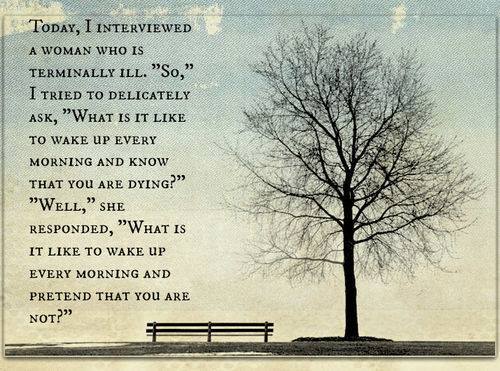
In addition to contemplation, conversation with friends and loved ones might be a useful activity to instigate decision-making. Simply imagining – out loud – how it might feel to be at the end of your life could be a great beginning. What does it look like? Who is around you? Smells? Sounds? Fear? Anxiety? Discord? Anticipation?
We cannot possibly know how our end will come – or go. However, we can begin to ‘plan’, based on our own held values and preferences, the kind of container and care that might suit us best. And document and share that information with our loved ones. These are the kinds of details that create advance directives.
DISCUSSION
Dead is a four letter word. Perhaps that is why it is not uttered in polite company. There is very little general discussion about what happens when dying, after death. It seems to be some kind of secret. But we all do it. Like sex. Let’s talk about it. Might make it easier.
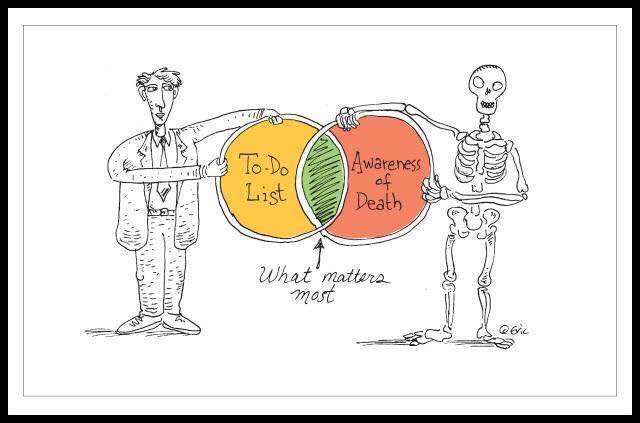
Imagine if dying & death were common subjects of discussion… if we could approach this very normal life experience (which we share with each and every sentient being on the planet) as ordinary…. as healthy… as universal… perhaps even celebratory. Discussion over dinner, at the spa, while walking in the park, or driving the kids to school…
We might even have ordinary, everyday discussions about our preferences at the time of dying …. who would be there, details of the environment – sounds, smells, sights. Not that we really have a choice. But imagine what it might be like if close friends and family actually knew what we wanted, actually understood our values and wishes… without fear. Imagine…. the possible benefits of discussion of our hopes and fears. Death matters. Discussions of death matter.
DISPOSAL
The word ‘disposal’ is a roundabout way of getting to the word ‘corpse’. It happens to be something that is necessary to do with a corpse… one way or another. What way will you choose? Or will you let someone else make that decision (another great ‘d’ word) for you? If so, who? How will they know what you want?
What are the choices for disposal of a corpse here in Nova Scotia?
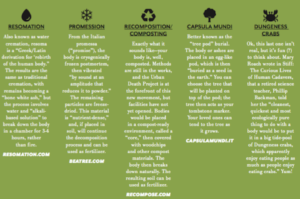
None of the above….. yet.
However, you do have the options of cremation, conventional burial, or green burial. The former two have a significant negative impact on the environment. The latter, however, replenishes our soils, and leaves a very minimal carbon footprint.
So, if you care about the method of disposal of your corpse, you might want to consider your options before you die, and document and share them with the folks who will be taking care of your body.
If you care about the environment, choose green burial…. for more information go to www.greenburialns.ca.
DEMYSTIFY
Experience brings familiarity. Sometimes. What we don’t know is a mystery. Death is a mystery. And is surrounded by myths. Bringing curious investigation to any and all experiences may discover truths. Myths could be proven or disproven.
For instance, death is not an emergency. The body of your loved one can be taken care of at home… with a little preparation (and some ice packs). In fact, if the death occurs in an institution, you could move the body to your home for lying in. A funeral home, funeral director, and embalming are not required, though their expertise with handling corpses can sometimes be helpful. Granted, there is official paperwork that must be filed, but Access Nova Scotia can help.
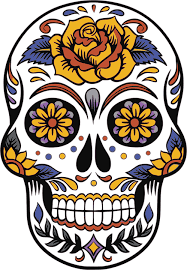
The ritual cleansing of the dead has been practiced in some form in almost every culture for thousands of years. It is natural and normal. And can go a long way to facilitating a healthy grieving process. Caring for and honouring our dead is absolutely sensible….. and a logical extension of the love and care we have for each other from the time of birth.
Think about it.
DELIGHT
Is it possible to take delight in everyday life? What is delight? Is it a feeling? And experience? A way of being?
Of the light…
And how is it possible to be delighted? Of what benefit?
Contemplate what gives you a feeling of delight, what makes you delighted – whatever that means to you. Allow yourself to be immersed in a memory of experiencing delight…. the birth of a new human being, picking and eating fresh, home grown tomatoes, listening to a favourite piece of music, breaking into uncontrollable laughter, and on and on. What delights you may be different from what delights anyone else… but there do seem to be some common denominators.
What does it feel like? Where is it felt? Is it something you might like to cultivate? Can it be cultivated?
Experiment with bringing to mind (and heart) the memory-feeling of that which delights you. Are you able to call it up? Can it be sustained? How might it be valuable to practice being delighted? To delight others?
Try smiling at perfect strangers on the street, in the grocery store, or wherever you go. What happens?
My experience is a state of warmth and openness in my heart centre, and a lightness in my ‘being’. I endeavour to become more and more familiar with this ability to be totally present, open, and appreciative now. I suspect it might serve me (and others) very well…. especially at the time of death.
DANGEROUS
Life can be dangerous, full of unexpected happenings, and generally has an abrupt ending. It is frail and fleeting…. and precious. Knowing all of that, one might imagine that we would appreciate the sacredness of every moment of experience.

The opportunity is certainly available… to recognize the precarious beauty of now. This very moment will never come again. Although it may be gruesome or terrifying, ugly or disgusting, it is, nevertheless, our unique experience.
There is a danger in pretending otherwise, in wishing for another now. There is a danger that we may miss our life… while we wait for it to happen.
If we are habitually looking forward (or backward), there is a danger that satisfaction, contentment, and joy might never be experienced.
Mahatma Gandhi said “Live as if you were to die tomorrow. Learn as if you were to live forever”.
I suggest that the living needs to be full of loving. Loving that we have the gifts we have been given – whatever they may be. And loving that we are able to give those gifts until the moment of death… and perhaps beyond.
DECOMPOSE
Know what happens when your food and yard ‘waste’ is composted? Eventually, with a little water, air, and time, soil is produced and can be used to grow more life.
How about the decomposition of your body?
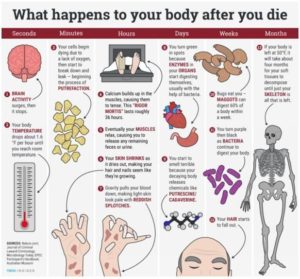
“Composting is an aerobic method (meaning that it requires the presence of air) of decomposing organic solid wastes.[1] It can therefore be used to recycle organic material. The process involves decomposition of organic material into a humus-like material, known as compost, which is a good fertilizer for plants.”
If your corpse is given the opportunity to rest in ground that is alive, it too will become healthy soil.
However, our current burial practices include techniques to avoid decomposition by embalming the body, putting it in a polyester and steel lined casket which is then dropped into a polymer-lined concrete vault creating a long-term toxic soup, some of which seeps into our water supply.
Or one could opt for cremation and create a giant carbon footprint on the way out.
Green burial is an option for corpse disposal that allows the body to decompose naturally and nourish the soil. Think about it.
Directive
How do you want to die? Since death is certain, it might be good to consider the possibilities.
Do you want to die at home? Or in a forest? Or on the high seas?
While cooking? Skydiving? Making love?
Do you want to be alone? With family or friends? Hooked up to life saving machines, surrounded by strangers?
Think about it. Then talk about it. Then write it down, and share it with those who care. That’s called a directive.
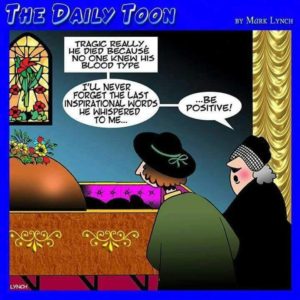
There are many names for this document. Advance Directive is common. In Nova Scotia, Personal Health Care Directive is used. The name is not important. The contents are.
Unless you contemplate, discuss, and document your end-of-life wishes, and choose a delegate (someone to speak for you if and when you are unable), there is no reason to expect that anyone will know what you want.
And putting it off is equally foolish. Death comes without warning. If you are lucky, it will not come until you are old and frail and ready to go. But, as we know, every day many folks die unexpectedly… and in bizarre circumstances.
Do not continue to move this task to the bottom of your list. You may need your directive TODAY.
Deception
Are we living under a cloud of deception? Is the pretense of ‘immortality’ serving us? Can we really be happy with newer stuff? With the latest apps? Or flitting from one trend to the next? Having more friends on FaceBook?
Not embracing our shared mortality for even a moment may cause us to stray from the truth. All experience, no matter how profound, is temporary. So how can we know that we are not deceiving ourselves? What is mortality anyway?
Unfortunately, Merriam-Webster is not all that helpful – ‘the quality or state of being mortal’. Being mortal means being subject to death, to the temporariness of our condition – at any time, in any moment. Nothing stays the same. Thoughts come and go. Feelings, no matter how intense, arise and cease (eventually). Our friends morph into our enemies – or vice versa. Even the idea that this is a sad state of affairs will pass. We are blessed with continuous opportunities to develop appreciation.
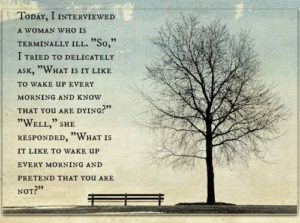
Perhaps getting used to this reality now is good practice for the seemingly enormous change that comes when it is time to give up our body…. this mortal existence.
Discovery
Now is the time in one’s life to make discoveries. Now is always the time… for most things. The past is no longer here…. and, try as we might, we cannot change it. The future has not yet arrived, and, though we make plans, we know that those plans are tentative, and that, despite our best efforts, everything changes. Often unexpectedly.
So what is to be discovered now? And how do we go about it?

Perhaps in each moment the experience of a lifetime can be discovered …. infinite beauty and delight…. boundless appreciation… love. What happens if we stay still for this moment and simply notice what we see, hear, smell, taste, feel…. fully…. without commentary, judgment, analysis? Perhaps a discovery!
This habit – of being fully present and appreciative – will serve us well at the time of death.
Dead
 The dreaded “d” word. The word we find ourselves unable to use. In lieu of “dead”, we say…. bite the dust, bought the farm, cash in one’s chips, departed, expired, gave up the ghost, gone to meet one’s maker, immortally challenged, in a better place, kicked the bucket, living-impaired, no longer with us, passed away, pushing up daisies, resting in peace, shuffled off this mortal coil, six feet under, with the angels, and many more euphemisms.
The dreaded “d” word. The word we find ourselves unable to use. In lieu of “dead”, we say…. bite the dust, bought the farm, cash in one’s chips, departed, expired, gave up the ghost, gone to meet one’s maker, immortally challenged, in a better place, kicked the bucket, living-impaired, no longer with us, passed away, pushing up daisies, resting in peace, shuffled off this mortal coil, six feet under, with the angels, and many more euphemisms.
Anything but “dead”!
Go ahead… practice saying it out loud… “dead… dead… dead”.
Saying the word won’t kill you. In fact, getting familiar with the idea that becoming dead is inevitable may just bring renewed appreciation to every moment of your life!